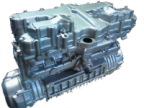- Posts: 177
- Thank you received: 27
Disc Brake Check Valves
- rdurost
-
 Topic Author
Topic Author
- Offline
- Elite Member
-

All of my street bikes have had front disk brakes, and obviously none have needed to be pumped up before use. What I'm seeing with the El-Cheapo $15 universal master cylinder is that I can achieve a good "pedal" on a given day, but when I come back the next day, it seems to have lost its prime, so to speak. Is this MC defective, or is there a check valve in the 1:2 factory distribution block that splits the pressure from the MC into the two slave cylinders that's stuck, or what?
Please Log in or Create an account to join the conversation.
- Bucko
-

- Offline
- Platinum Member
-

- Posts: 693
- Thank you received: 171
rdurost wrote: On automobiles, I believe it's pretty much universal to have a check valve in a hydraulic disc brake circuit that restricts fluid from returning from the slave cylinder(s) at the wheels to the master cylinder when the vehicle is sitting. This keeps the slave cylinders from retracting the pads away from the discs, so that when the vehicle is next used, the brakes will be instantly effective instead of needing to be "pumped up" before they're useful.
All of my street bikes have had front disk brakes, and obviously none have needed to be pumped up before use. What I'm seeing with the El-Cheapo $15 universal master cylinder is that I can achieve a good "pedal" on a given day, but when I come back the next day, it seems to have lost its prime, so to speak. Is this MC defective, or is there a check valve in the 1:2 factory distribution block that splits the pressure from the MC into the two slave cylinders that's stuck, or what?
Can't speak about car brakes but motorcycle brakes definitely don't operate as you suggest. Motorcycle master cylinders have an equalizing hole in the hydraulic circuit to allow fluid to bleed back into the master cylinder when the brakes are at rest. The equalizing hole is required to allow for thermal expansion of the fluid and to accommodate increased rotor/pad thickness due to heat expansion (and to allow from some rotor 'warpage'). If the pads aren't allowed to float by having fluid flow back into the master cylinder, the brakes will lock up (which is exactly what happens if the equalizing hole get plugged - usually because the fluid hasn't be flushed frequently enough). The equalizing hole is located in front of the master cylinder piston so it's open when the brakes are at rest but when the brakes are applied the master cylinder piston moves forward and 'closes' the equalizing hole so that solid pressure is maintained - but only while the brakes are applied - maybe this is the 'check valve' action you're thinking of?
Friction keeps the slave cylinder pistons where you used them last (with the rubbers boots and seals pulling them back slightly) unless they contact the rotor which will push them slightly back into the bores so they're not in contact with the rotor when the brakes aren't on.
Hello from Canada's We(s)t coast.
Please Log in or Create an account to join the conversation.
- scotch
-

- Offline
- Sustaining Member
-

- Posts: 1943
- Thank you received: 853
The caliper boots and seals have nothing to do with removing applied brake application pressure. The spring in the M/C returns the this piston to "Home" and in doing so draws back the fluid - which removes the applied pressure to the brake- pads .
There is no "check-valve" anywhere in the system, nor can there be for what should be an obvious reason.
Regarding the "El Cheapo" master cylinders: When I converted to a Hydraulic clutch I purchased these as to have matching masters:
No issues or concerns. They work perfectly per application.
1980 KZ 1300 sr# KZT30A-009997
Always High - Know Fear !
Please Log in or Create an account to join the conversation.
- Bucko
-

- Offline
- Platinum Member
-

- Posts: 693
- Thank you received: 171
Hello from Canada's We(s)t coast.
Please Log in or Create an account to join the conversation.
- scotch
-

- Offline
- Sustaining Member
-

- Posts: 1943
- Thank you received: 853
I guess they're all wrong.
Not going to debate whether the "seals and boots" retract the pistons. For the purpose of clarity - The spring in the M/C returns the M/C piston - thereby pulling the caliper pistons away from the disc. when the lever application pressure is nil. Fluid Dynamics !
1980 KZ 1300 sr# KZT30A-009997
Always High - Know Fear !
Please Log in or Create an account to join the conversation.
- rdurost
-
 Topic Author
Topic Author
- Offline
- Elite Member
-

- Posts: 177
- Thank you received: 27
There are a few disk brake applications that use RPVs, but apparently most don't need them.
www.speedwaymotors.com/Speedway-Disc-Bra...PSI-Purple,5312.html
Please Log in or Create an account to join the conversation.

